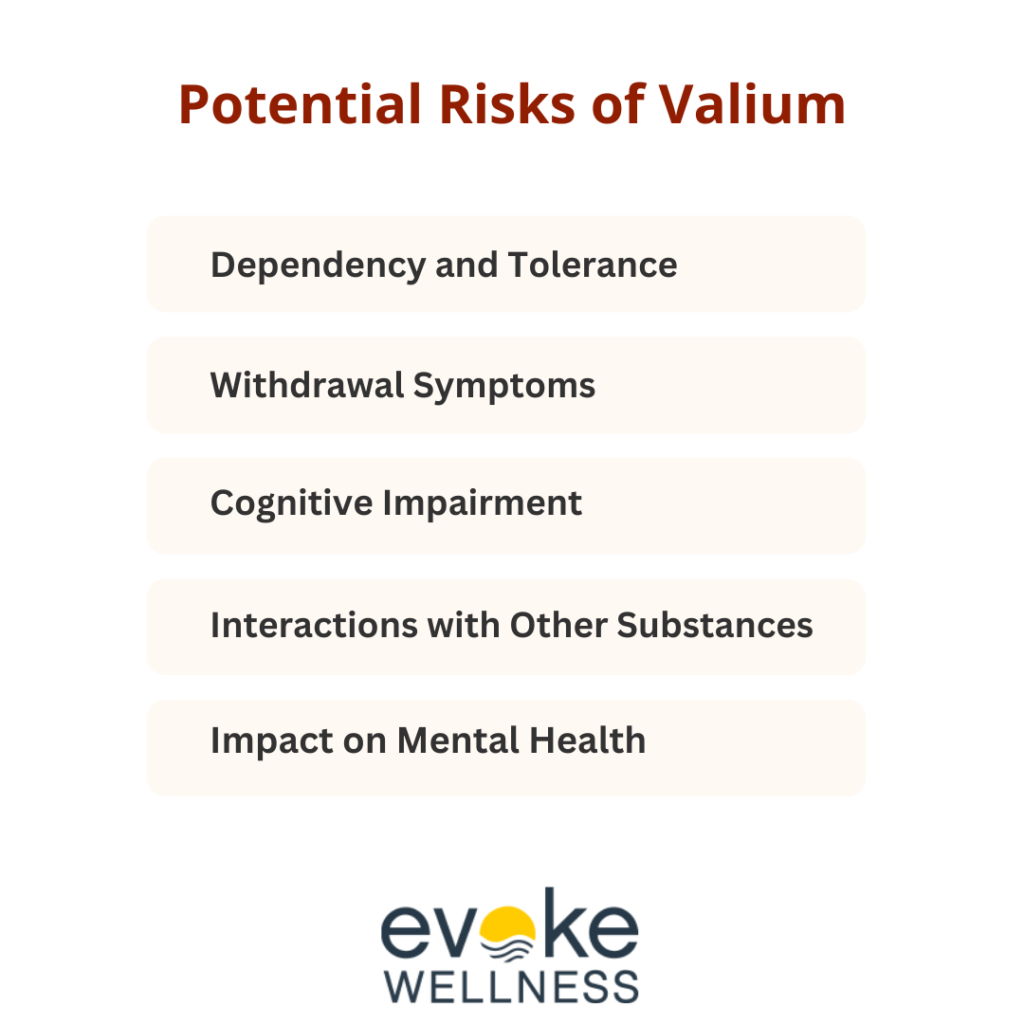Valium, known generically as diazepam, is a medication that belongs to the benzodiazepine class of drugs. Renowned for its calming and sedative effects, Valium is primarily used to treat various medical conditions, including anxiety, muscle spasms, and symptoms associated with alcohol withdrawal. While it can be an effective treatment option, understanding its medical uses and potential risks is crucial, especially for individuals in recovery from substance use disorders. At Evoke Wellness at San Marcos, we are committed to providing comprehensive and responsible information regarding medications like Valium, emphasizing the importance of informed decisions in the recovery process.
Together, let’s embrace the journey to recovery and the promise of a new beginning. Call us at (833) 503-0734 today or reach out online.
Medical Uses of Valium
1. Anxiety Disorders
Valium is most commonly prescribed for anxiety disorders, including generalized anxiety disorder (GAD) and panic disorder. It works by enhancing the effects of a neurotransmitter called gamma-aminobutyric acid (GABA) in the brain, which helps to calm neural activity. By doing so, Valium provides immediate relief from anxiety symptoms, allowing individuals to regain control over their thoughts and feelings. Patients often report significant improvements in their ability to manage anxiety, making it easier to engage in daily activities and social interactions.
2. Muscle Spasms
In addition to its anxiolytic effects, Valium is effective in treating muscle spasms and associated discomfort caused by various conditions, such as back pain, neck injuries, or neurological disorders. By relaxing the muscles and reducing tension, Valium helps improve mobility and alleviate pain. This can be particularly beneficial for individuals undergoing physical rehabilitation or those recovering from injuries, allowing them to participate more fully in their recovery programs.
3. Alcohol Withdrawal
Valium plays a crucial role in managing alcohol withdrawal symptoms for individuals who are detoxifying from alcohol. During withdrawal, individuals may experience severe symptoms, including anxiety, tremors, hallucinations, and seizures. Valium’s sedative properties help to alleviate these symptoms, ensuring a safer and more comfortable detox process. By providing stability during this critical phase, Valium can help prevent complications associated with alcohol withdrawal.
4. Sedation for Medical Procedures
Valium is often used as a pre-medication to induce sedation and relieve anxiety before medical procedures or surgeries. It helps patients feel relaxed and at ease, making them more comfortable during procedures that may otherwise cause distress. This use of Valium is particularly common in dental work, endoscopic procedures, and minor surgeries.
5. Seizure Disorders
In certain situations, Valium may be prescribed as an adjunct treatment for specific seizure disorders, such as status epilepticus. It acts as a central nervous system depressant, helping to control seizures and prevent their recurrence. This application is particularly valuable in emergency settings where rapid seizure control is essential for patient safety.
Side Effects of Valium (Diazepam)
Valium (diazepam) is a widely prescribed benzodiazepine known for its ability to relieve anxiety, relax muscles, and induce sedation. While many individuals benefit from its calming effects, it is essential to be aware of the potential side effects associated with its use. Understanding these side effects can help individuals make informed decisions regarding their treatment options, particularly for those in recovery.
Common Side Effects
- Drowsiness and Fatigue
One of the most common side effects of Valium is drowsiness. While this sedative effect can be beneficial for those experiencing anxiety or insomnia, it may impair an individual’s ability to perform daily tasks that require alertness, such as driving or operating machinery. Fatigue may also occur, leading to decreased motivation and energy levels. - Dizziness and Lightheadedness
Some individuals may experience dizziness or lightheadedness, especially when standing up quickly. This effect can increase the risk of falls, particularly in older adults or those with compromised balance. - Confusion and Cognitive Impairment
Valium can affect cognitive function, leading to confusion, difficulty concentrating, and impaired memory. This is especially concerning for individuals in recovery, as cognitive impairment can hinder their ability to engage fully in therapeutic interventions and recovery programs. - Blurred Vision
Some users may experience visual disturbances, such as blurred vision, which can further complicate daily activities. This side effect can be disorienting and may affect an individual’s overall quality of life. - Dry Mouth and Increased Salivation
Valium can cause dry mouth, leading to discomfort and potential dental issues. Conversely, some individuals may experience increased salivation, which can also be uncomfortable. - Nausea and Gastrointestinal Issues
Gastrointestinal side effects, such as nausea, vomiting, or constipation, may occur in some users. These effects can be distressing and may lead individuals to discontinue use without consulting their healthcare provider.
Serious Side Effects
While most side effects are manageable, some serious adverse effects can occur, warranting immediate medical attention:
- Respiratory Depression
Valium can depress the respiratory system, leading to shallow or slowed breathing. This effect is particularly dangerous when Valium is taken in combination with other central nervous system depressants, such as alcohol or opioids. Individuals with existing respiratory conditions should use caution and consult with their healthcare provider. - Allergic Reactions
Though rare, allergic reactions to Valium can occur. Symptoms may include rash, itching, swelling (especially of the face, tongue, or throat), and difficulty breathing. If any signs of an allergic reaction arise, immediate medical attention is necessary. - Paradoxical Reactions
In some cases, Valium can cause paradoxical reactions, leading to increased anxiety, agitation, aggression, or hallucinations. These unexpected effects can be alarming and may indicate that the individual should discontinue use. - Dependency and Withdrawal Symptoms
Long-term use of Valium can lead to physical and psychological dependence. When individuals attempt to stop using the medication, they may experience withdrawal symptoms, including heightened anxiety, tremors, seizures, and insomnia. This potential for dependence is a significant concern, especially for those in recovery from substance use disorders.
Potential Risks of Valium
While Valium offers numerous benefits, it is essential to be aware of its potential risks, especially for individuals in recovery from substance use disorders:
1. Dependency and Tolerance
One of the most significant risks associated with Valium is the potential for dependency. With prolonged use, individuals may develop a tolerance, meaning they require increasingly higher doses to achieve the same therapeutic effects. This cycle of increasing dosage can lead to physical and psychological dependence, making it challenging to discontinue the medication.
2. Withdrawal Symptoms
Abruptly stopping Valium can result in withdrawal symptoms, which can be severe and potentially life-threatening. Symptoms may include heightened anxiety, insomnia, tremors, seizures, and in extreme cases, delirium. Individuals with a history of substance use disorders may find the prospect of withdrawal particularly daunting, leading them to continue using Valium despite its risks.
3. Cognitive Impairment
Long-term use of Valium has been associated with cognitive impairment, including memory problems, difficulty concentrating, and slowed reaction times. This cognitive decline can adversely affect an individual’s ability to engage in therapy and participate in daily activities, hindering their recovery journey.
4. Interactions with Other Substances
Valium can interact dangerously with other medications, particularly other central nervous system depressants such as alcohol, opioids, and certain antidepressants. These interactions can enhance sedative effects, increasing the risk of respiratory depression, coma, and even death. For individuals in recovery, using Valium alongside other substances can be particularly risky and may lead to relapse.
5. Impact on Mental Health
For individuals in recovery, the use of Valium can complicate their treatment journey. It may mask underlying mental health issues, making it challenging to address the root causes of anxiety or other conditions. Relying on medication without engaging in therapeutic interventions can hinder progress in addiction therapy programs.
Finding Support at Evoke Wellness at San Marcos
At Evoke Wellness at San Marcos, we understand the complexities surrounding the use of medications like Valium, particularly for individuals in recovery. Our holistic approach to treatment encompasses various Substance Abuse Treatment Programs tailored to meet the diverse needs of our clients.
1. Addiction Treatment Programs
Our evidence-based Addiction Treatment Programs integrate various therapeutic modalities designed to address the physical, emotional, and psychological aspects of addiction. We emphasize the importance of a personalized approach, ensuring that each individual receives care that is tailored to their specific needs and circumstances.
2. Cognitive-Behavioral and Dialectical Behavior Therapy
Our Cognitive-Behavioral Therapy Programs focus on identifying and changing negative thought patterns and behaviors that contribute to substance use and mental health challenges. In addition, our Dialectical Behavior Therapy Programs provide skills to manage emotions, improve interpersonal relationships, and reduce self-destructive behaviors, essential for those facing dual diagnoses.
3. Family and Group Therapy
Recognizing that addiction impacts not only the individual but also their loved ones, we offer Family Therapy Programs to foster open communication and healing within the family unit. Additionally, our Group Therapy Programs create a supportive environment where individuals can share their experiences, learn from one another, and build a sense of community that is vital for recovery.
4. Compassionate Care and Support
Our team of experienced professionals is dedicated to providing compassionate care, ensuring that individuals feel understood and supported throughout their recovery journey. We prioritize a holistic approach to treatment, emphasizing emotional, physical, and mental well-being. Our goal is to empower individuals to reclaim their lives and achieve lasting recovery.
Conclusion
While Valium can serve as an effective treatment for anxiety, muscle spasms, and other medical conditions, it is crucial to be aware of its potential risks, particularly for those in recovery. Understanding these risks and seeking support is vital for achieving lasting recovery.
If you or a loved one is struggling with substance use or is considering the use of medications like Valium, contact Evoke Wellness at San Marcos today. Our dedicated team is here to help you navigate your path to recovery safely and effectively. Don’t hesitate to reach out—your journey toward a healthier, drug-free life starts now. Together, let’s embrace the journey to recovery and the promise of a new beginning. Call us at (833) 503-0734 today or reach out online.
FAQ on Valium Side Effects, Uses
What is Valium used for?
Valium (diazepam) is primarily used to treat anxiety, muscle spasms, and seizures. It is also prescribed for alcohol withdrawal symptoms and as a sedative before medical procedures.
What are the common side effects of Valium?
Common side effects include drowsiness, dizziness, confusion, dry mouth, and gastrointestinal issues. While these effects are generally manageable, they can impact daily activities.
Are there serious side effects associated with Valium?
Yes, serious side effects can include respiratory depression, allergic reactions, and paradoxical effects such as increased anxiety or agitation. Long-term use may lead to dependency and withdrawal symptoms.
How does Valium affect individuals in recovery?
For individuals in recovery from substance use disorders, Valium poses a risk of dependency and potential interactions with other substances. It is crucial to discuss medication use with a healthcare provider.
Where can I find help for Valium abuse and addiction?
If you or a loved one is struggling with Valium abuse or addiction, consider reaching out to an addiction treatment center like Evoke Wellness at San Marcos for comprehensive support and treatment options.



